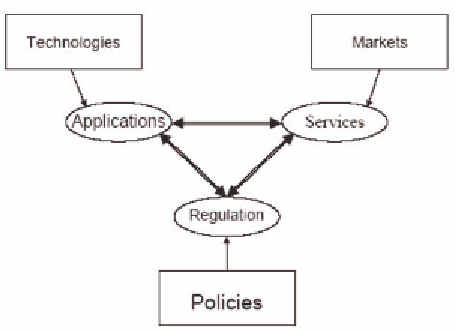Information Technology Reference
In-Depth Information
developments in the United States and Korea).
By extension, the contracts that firms enter into
may also impose asymmetric obligations affect-
ing subsequent strategic choices made by the
firms concerned (e.g. Evans & Quigley (2000),
with respect to the different litigation options
competition law offers incumbents entering into
contracts which may be subject to the exertion
of market power).
In 1990, a contractual deed entered into by
the New Zealand Government and the newly-
privatised incumbent telecommunications pro-
vider Telecom New Zealand Limited (hereinafter
'Telecom'), known as the 'Kiwi Share', imposed
additional obligations upon Telecom over and
above those required under either the Commerce
Act or the Telecommunications Act regula-
tory provisions
1
and to which no other firm was
bound (Howell, 2008). The 'Kiwi Share' bound
Telecom to three explicit obligations: that the
price of residential telephone rentals would not
rise faster than the Consumer Price Index (CPI)
unless profits were unreasonably impaired (the
'price cap' obligation); that rural residential line
rental prices would not exceed urban residential
line rentals (the 'universal service' obligation);
and that residential customers would continue to
be offered a tariff with no charges for local calls
(the 'free local calling' obligation)
2
(Boles de
Boer & Evans, 1996).
As the 'Kiwi Share' obligations applied only
to one firm in a market where the development
of competition was an explicit
a priori
expecta-
tion, it would be expected that both Telecom and
its competitors, customers, regulators and other
stakeholders would take the asymmetric obliga-
tions into account when selecting the strategies
upon which they would interact with each other.
The contract thus formed part of a bundle of
asymmetric 'regulatory obligations' deriving
from all legislative and contractual origins that
bind one firm differently from its competitors.
The asymmetric obligations will therefore have
affected the choice of firm strategies not just in
respect of their interactions with each other, but
also their interactions with markets (consumers),
policy-makers and the technologies that they
choose to adopt (as per Figure 1).
This chapter takes the form of a case study,
examining the effect of the asymmetric 'Kiwi
Share' obligations upon strategic interaction be-
tween all of Telecom, its competitors, customers
and policy-makers in the New Zealand telecom-
munications sector during the period 1990 to 2008.
Section 1 traces the origins of the 'Kiwi Share'
provisions and places them in their institutional
Figure 1. Telecommunications Sector Interaction (Source Melody (2002:9))

Search WWH ::

Custom Search